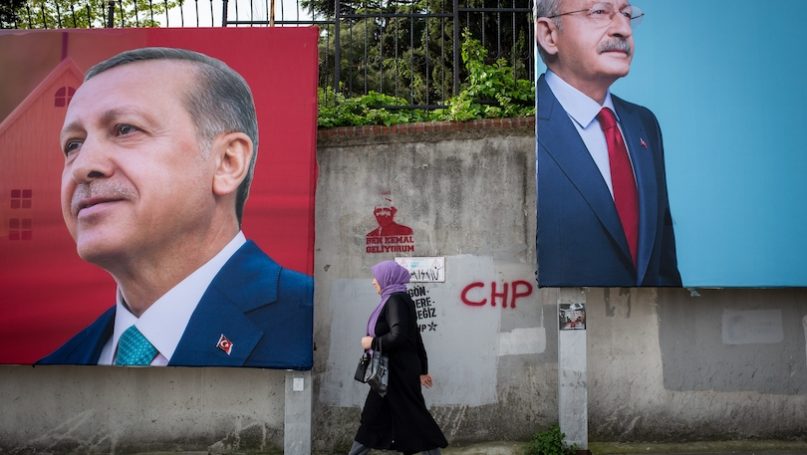
In recent years Turkish President Recep Tayyip Erdoğan has threatened to bomb Athens, blocked Sweden from joining NATO, and cozied up to Vladimir Putin. He’s done all this while systematically dismantling Turkish democracy, bungling the nation’s economy, and overseeing a sluggish recovery effort in the wake of February’s devastating earthquakes. In short: many in the West and in Turkey would love to be rid of Erdoğan’s rule. For them, this Sunday’s presidential and parliamentary elections could bring good news. If the most recent polls hold, and the opposition manages to capture a clear majority, Erdoğan and his AK Party could lose power for the first time since 2003. But while Erdoğan’s ouster would be celebrated by many, relations between Turkey and the US, NATO, and the EU are likely to remain fraught for the foreseeable future.
If Erdoğan loses, Turkey’s new president, Kemal Kılıçdaroğlu, would be tasked with rebuilding a significant swath of the country leveled by February’s earthquakes, addressing growing popular angst about the 3 million Syrian refugees in Turkey, and righting the nation’s dire economic situation. Kılıçdaroğlu would have to take on these burdens with his Nation Alliance, an unwieldy coalition of alienated ex-Erdoğan allies, far-right populists, liberals, and center-left parties.
It’s easy to imagine this scenario playing out for Kılıçdaroğlu like Naftali Bennett’s brief interregnum in Israel. Regardless of the election’s outcome, Erdoğan, like Netanyahu in Israel, will likely remain a major figure in Turkish politics with a large and devoted base of supporters. Should Kılıçdaroğlu’s government falter or stumble early on, Erdoğan could very plausibly mount a Bibi-esque comeback and reclaim power with a new, more hard line coalition of religious conservatives and right-wing nationalists.
Even now, the coalition Erdoğan’s cobbled together to take on the opposition includes a mix of small parties once relegated to the fringes of Turkish politics. The AK Party’s new bedfellows have already pushed the coalition to advocate for further rolling back LGBTQ+ rights and protections for women against domestic violence. Should Kılıçdaroğlu’s coalition fall apart, these are the sorts of parties that could return Erdoğan to power.
Rebuilding Turkey’s shattered southeast and getting the country’s economy back on track will likely require a massive influx of Western aid and direct investment. Encouraging that influx will undoubtably require mending the bridges burned in the last decade of Erdoğan’s rule. Indeed, Kılıçdaroğlu has already signaled that he wants to reset Turkish-EU relations and unblock Sweden’s accession to NATO.
Investors also appear to be eagerly anticipating the post-Erdoğan era. In a recent Washington Post article, the Brookings Institution’s Aslı Aydıntaşbaş recalled how one international hedge fund manager told her: “If Erdoğan leaves, Turkey will be the biggest trade of the year.” More recently, Turkish markets rallied when the potential spoiler candidate Muharram İnce announced he was dropping out of the race.
While those policy reversals would be certainly be welcomed in Brussels, Washington, and Wall Street, they could come with a hefty political price for the new administration.
Recent polls indicate that the Turkish public is deeply skeptical of NATO and a significant majority of Turks view the US as the largest foreign threat to Turkey. On the campaign trail, Erdoğan’s made political hay out of accusing Kılıçdaroğlu of secretly negotiating with the IMF and meeting with other Western financiers in London. Erdoğan’s Interior Minister even floated the idea that, by running for president, Kılıçdaroğlu is an accomplice to a US-led coup plot.
Even if Erdoğan is unable to claw back to power, it’s not unreasonable to see him and his allies leveraging the Turkish electorate’s wide-spread misgivings about Western powers to sow chaos, undermine Kılıçdaroğlu’s administration, and fracture his Nation Alliance coalition. The implications are even more dire should the AK Party hold onto their majority in parliament, splitting the government, or if the election is so close that Erdoğan refuses to accept the results.
Perhaps the greatest political challenge a victorious Kılıçdaroğlu would face is the Turkish state that Erdoğan has rebuilt in his own image over the past twenty years. As the Council on Foreign Relations’ Henri Barkey noted in National Interest: virtually every institution in Turkey, from the press, public universities, and the central bank, to the military and the judiciary have been brought under Erdoğan’s control. Engineering a successful post-AK Party Turkey will require wresting those institutions from Erdoğan loyalists in order to restore their independence. This process will likely take considerable political capital expended over a long period of time.
Many analysts, understandably savoring the prospect of a post-Erdoğan era see in Kılıçdaroğlu a more pliant and reliable partner. But given the political climate in Turkey and the enormous challenges facing the country, Western powers should prepare to be patient. Even a sweeping victory wouldn’t give Kılıçdaroğlu the political capital necessary to make the sorts of concessions on matters like sanctioning Russia or giving up Turkey’s newly acquired Russian S-400 air defense system. Sacrificing his country’s military might or alienating one of Turkey’s largest trading partners could only help Erdoğan return to power.
If voters ultimately sweep Kılıçdaroğlu and the Nation Alliance into power this Sunday, the end of the Erdoğan era is still by no means guaranteed. To truly turn the corner, Turkey will need strong and steady leadership at home and patience from Western leaders abroad.
Further Reading on E-International Relations
- Opinion – Turkey’s May Elections Are about Regime Change
- Opinion – Disappointments and Expectations in Turkey
- Deciphering Erdoğan’s Foreign Policy after Turkey’s 2023 Elections
- The Fragility of Turkish Democracy
- Erdoğan’s Foreign Policy: Strategy Without Doctrine
- Opinion – Türkiye’s 2024 Local Elections Challenge President Erdoğan